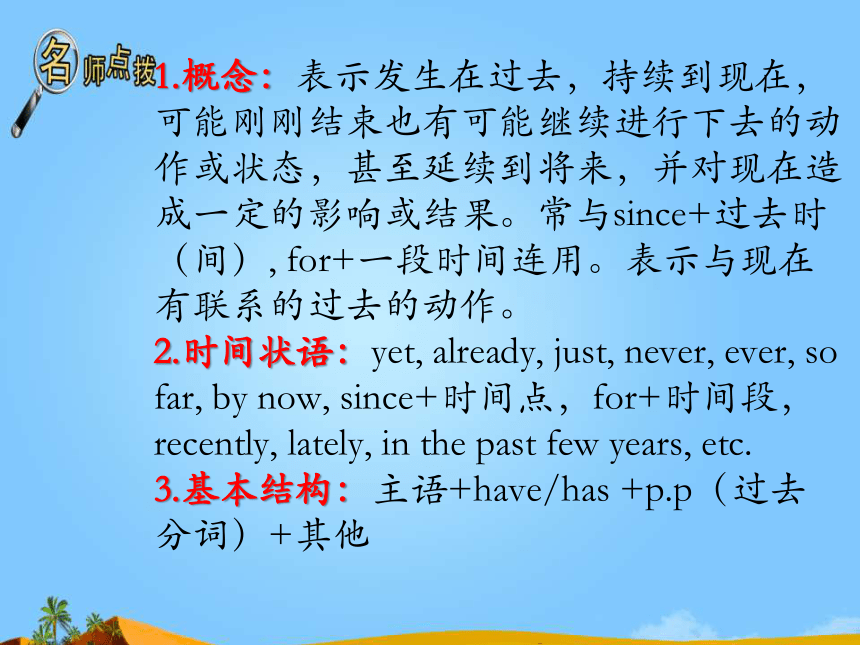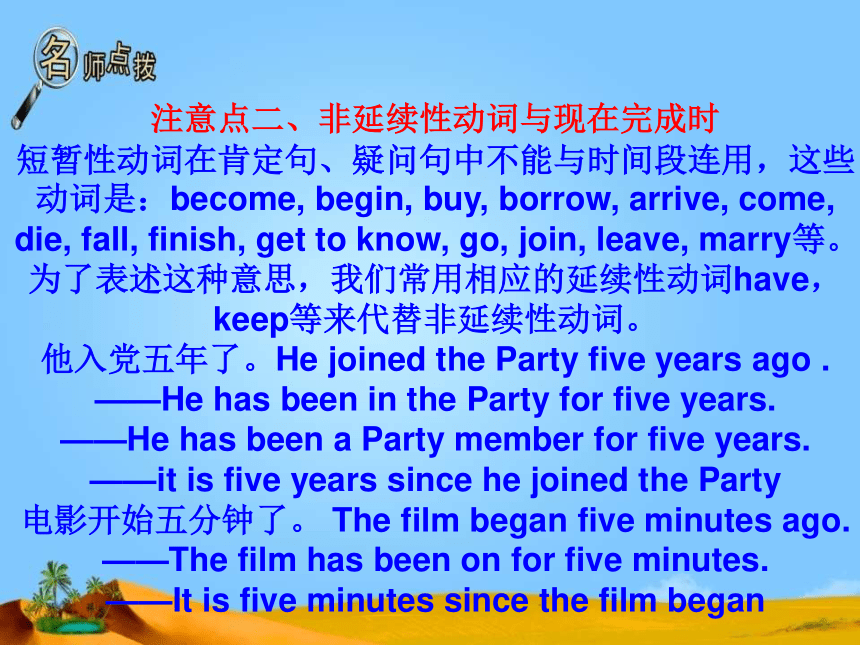现在完成时课件
图片预览









文档简介
课件21张PPT。现在完成时
Present Perfect Tense 管秀贵 3现在完成时考频:★★☆目标要求:
□了解 □理解 □掌握 □灵活运用41.概念:表示发生在过去,持续到现在,可能刚刚结束也有可能继续进行下去的动作或状态,甚至延续到将来,并对现在造成一定的影响或结果。常与since+过去时(间), for+一段时间连用。表示与现在有联系的过去的动作。
2.时间状语:yet, already, just, never, ever, so far, by now, since+时间点,for+时间段,recently, lately, in the past few years, etc.
3.基本结构:主语+have/has +p.p(过去分词)+其他
5现在完成时的用法1. 表示过去发生或已经完成的某一动作对 现在造成的影响或结果。-Have you had your lunch yet?
-Yes, I have. I have just had it.(现在不饿了。)I have already posted the photos.
(照片已不再我这里了)Mary with his family has never been to China before.-Have they ever heard of the story?
-No, not yet.6通常与表示包括现在在内的时间副词 just(刚刚), already(已经), before, yet(一般疑问:已经;否定句:还) never, ever等状语连用
① I have never heard of that before.
② Have you ever ridden a horse?
③ She has already finished the work.
④ Have you milked the cow yet? Yes, I have done
that already.
⑤ I’ve just finished my homework.
⑥ He has not come yet.
2:
E.g. Kate has lived here for 3 years.
Kate has lived here since 3 years ago.
Kate has lived here since she came to China.
I haven’t seen her these days.
表示过去某个时间开始的动作或存在的状态,一直持续到现在并可能还将持续下去。动词使用延续性动词。常与for或since引导的时间连用以及 so far, by now, these days, in the last ten years 等连用。
注意点一:
现在完成时与一般过去时的用法比较
现在完成时表示过去的动作一直延续到现在甚至会继续下去或表示过去的动作对现在造成的影响;一般过去时表示动作发生的时间在过去。现在完成时属于现在时态范围,因此,不能和表示过去的时间状语连用。 如:yesterday, last night, two weeks ago等
试比较:
The plane has arrived . 飞机已经来了。(说明现在的情况:飞机在这儿)
The plane arrived a quarter ago. 飞机是一刻中以前来的。(强调动作发生的时间在过去)
I have taught here for fifteen years. 我在这儿已经教了十五年。(表示十五年前的动作一直延续到现在,还可能会继续。)
I taught here for a year. 我过去在这儿教过一年。(表示“我“现在已经不在这儿任教了)注意点二、非延续性动词与现在完成时
短暂性动词在肯定句、疑问句中不能与时间段连用,这些动词是:become, begin, buy, borrow, arrive, come, die, fall, finish, get to know, go, join, leave, marry等。为了表述这种意思,我们常用相应的延续性动词have,keep等来代替非延续性动词。
他入党五年了。He joined the Party five years ago .
——He has been in the Party for five years.
——He has been a Party member for five years.
——it is five years since he joined the Party
电影开始五分钟了。 The film began five minutes ago.
——The film has been on for five minutes.
——It is five minutes since the film began
瞬间动词与延续性动词的转换come/go — be (in) leave — be away
borrow — keep buy — have
die — be dead get to know — know
begin — be on go out — be off
go out — be off arrive – be here/there
marry/get married (to)— be married (to)
fall asleep/get to sleep — be asleep
join the Party — be in the Party
/be a member of注意点三:have been in, have been to 与have gone to 的用法
1、have (has) been in 表示“在某地(多长时间)”,现在仍在那里。常与表示一段时间的状语连用。例如:
Mr. Brown has been in Shanghai for three days. 布朗来上海已经有三天了。
They have been in Canada for five years. 他们到加拿大有五年了。
2、have( has)been to表示“曾经去过某地”,现在已经不在那里了。可与just, ever, never等连用,例如:
I have just been to the post office. 我刚才去邮局了。
Mary has never been to the Great Wall. 玛丽从未去过长城。
Have you ever been to Hangzhou before? 你以前曾经去过杭州吗?
Have (has) been to 后面可接次数,表示去过某地几次。例如:
They have been to that village several times. 他们去过那个村庄好几次了。
3、have (has) gone to 意为“到某地去了”,表示到了某地或正在去某地的途中。总之,说话时该人不在现场,例如:
----Where is Tom? ----He has gone to the bookshop. 他到书店去了。
Jack Johnson has gone to London. 杰克.约翰逊到伦敦去了。巧解现在完成时态题技巧1:寻找现在完成时中的“段时间”。
(1) 现在完成时表示过去已经开始并持续到现在的动作或状态,多和表示一段时间的状语连用:for+一段时间;since+点时间(since作连词后接从句时,该从句要用一般过去时) 。
(2) 现在完成时态也用在含有during / in/ over the last years或in recent years等的句子中。
1. The Oriental Pearl TV Tower _______ tens of thousands of visitors since 1995.
attracted??? B. attracts?
C. has attracted?? D. will attract?
2. —How long _______ you _____ here? ???
—For about two years so far.?
have, studied?? B. did, live?
C. do, stay???????? D. were, swimming
3. —How is your father? I __him for a long time.????
—He is fine, but busy.
don’t see??? B. hadn’t seen
C. didn’t see??? D. haven’t seen
??
技巧2:寻找现在完成时的副词标志或句型。
(1) 在做时态题时,注意观察句中是否有常用于现在完成时的副词:yet, already, never, lately, recently, ever, just, before, (ever) since等。
(2) 句型:It has been + 段时间+since + 过去时. 也可以表示为: It is + 段时间+since + 过去时.?
—What are you going to do this weekend? ???
—I _______ yet.?
haven’t decided?? B. won’t decide
C. have decided ?? D. didn’t decide
2. My mother _______ the windows already, so the room looks much brighter.
has cleaned?? B. had cleaned
C. is cleaning ???? D. will clean
3. It ____ ten years since we last _____ in Beijing.
was, met?? ??? B. has been, met?
C. was, meet ???? ? D. is, meet 技巧3:把握have been to与have gone to的区别。
??????
have been to 曾经去过某处(现在已经不在那个地方,强调以前的经历)
have gone to去了某处(强调主语已经离开说话者所在的地方,现在还没有回来) ?
1. —Is that Jack speaking?
?? —Sorry, he isn’t in right now. He _______ the cinema with his aunt.
has been to??? ? ?B. has gone to
C. have been to ??? ?D. have gone to
2. —Hello, may I speak to your father, please?
???—Sorry, my father _______ to Shanghai. He went there this morning.
goes???? B. has gone??
C. has been? D. go
3. —How many times _______ you _______ to Beijing this year? ??? —Three times.
have, been ???? ?B. had, been
C. have, gone???? ? ?D. had gone
技巧4:分清延续性动词和非延续性动词。
延续性动词是指那些动作可以持续的动词。如:have, keep, study, live, teach等。
非延续性动词是指那些动作瞬间完成的动词。如:begin, buy, borrow, lend等。
做题时,要注意句中是否有段时间,如果有则用延续性动词。
1. —Oh, Mrs. King, your dress looks nice. Is it new?
??? —No, I _______ it since two years ago.?
had???? B. bought ??
C. have had?? D. have bought
2. Tom _______ the CD player for two weeks.
has lent???? B. has borrowed
C. has bought ? D. has had
3. —How long has the foreigner _______ here?
??? —He has _______ here for several hours.?
arrived; come?? B. come; got
C. stayed; been??? D. left; been away 现在完成时现在完成时的用法1现在完成时的用法2现在完成时与一般过去时的用法比较非延续性动词与现在完成时瞬间动词与延续性动词的转换have been in, have been to 与have gone to 的用法Thank you!
Present Perfect Tense 管秀贵 3现在完成时考频:★★☆目标要求:
□了解 □理解 □掌握 □灵活运用41.概念:表示发生在过去,持续到现在,可能刚刚结束也有可能继续进行下去的动作或状态,甚至延续到将来,并对现在造成一定的影响或结果。常与since+过去时(间), for+一段时间连用。表示与现在有联系的过去的动作。
2.时间状语:yet, already, just, never, ever, so far, by now, since+时间点,for+时间段,recently, lately, in the past few years, etc.
3.基本结构:主语+have/has +p.p(过去分词)+其他
5现在完成时的用法1. 表示过去发生或已经完成的某一动作对 现在造成的影响或结果。-Have you had your lunch yet?
-Yes, I have. I have just had it.(现在不饿了。)I have already posted the photos.
(照片已不再我这里了)Mary with his family has never been to China before.-Have they ever heard of the story?
-No, not yet.6通常与表示包括现在在内的时间副词 just(刚刚), already(已经), before, yet(一般疑问:已经;否定句:还) never, ever等状语连用
① I have never heard of that before.
② Have you ever ridden a horse?
③ She has already finished the work.
④ Have you milked the cow yet? Yes, I have done
that already.
⑤ I’ve just finished my homework.
⑥ He has not come yet.
2:
E.g. Kate has lived here for 3 years.
Kate has lived here since 3 years ago.
Kate has lived here since she came to China.
I haven’t seen her these days.
表示过去某个时间开始的动作或存在的状态,一直持续到现在并可能还将持续下去。动词使用延续性动词。常与for或since引导的时间连用以及 so far, by now, these days, in the last ten years 等连用。
注意点一:
现在完成时与一般过去时的用法比较
现在完成时表示过去的动作一直延续到现在甚至会继续下去或表示过去的动作对现在造成的影响;一般过去时表示动作发生的时间在过去。现在完成时属于现在时态范围,因此,不能和表示过去的时间状语连用。 如:yesterday, last night, two weeks ago等
试比较:
The plane has arrived . 飞机已经来了。(说明现在的情况:飞机在这儿)
The plane arrived a quarter ago. 飞机是一刻中以前来的。(强调动作发生的时间在过去)
I have taught here for fifteen years. 我在这儿已经教了十五年。(表示十五年前的动作一直延续到现在,还可能会继续。)
I taught here for a year. 我过去在这儿教过一年。(表示“我“现在已经不在这儿任教了)注意点二、非延续性动词与现在完成时
短暂性动词在肯定句、疑问句中不能与时间段连用,这些动词是:become, begin, buy, borrow, arrive, come, die, fall, finish, get to know, go, join, leave, marry等。为了表述这种意思,我们常用相应的延续性动词have,keep等来代替非延续性动词。
他入党五年了。He joined the Party five years ago .
——He has been in the Party for five years.
——He has been a Party member for five years.
——it is five years since he joined the Party
电影开始五分钟了。 The film began five minutes ago.
——The film has been on for five minutes.
——It is five minutes since the film began
瞬间动词与延续性动词的转换come/go — be (in) leave — be away
borrow — keep buy — have
die — be dead get to know — know
begin — be on go out — be off
go out — be off arrive – be here/there
marry/get married (to)— be married (to)
fall asleep/get to sleep — be asleep
join the Party — be in the Party
/be a member of注意点三:have been in, have been to 与have gone to 的用法
1、have (has) been in 表示“在某地(多长时间)”,现在仍在那里。常与表示一段时间的状语连用。例如:
Mr. Brown has been in Shanghai for three days. 布朗来上海已经有三天了。
They have been in Canada for five years. 他们到加拿大有五年了。
2、have( has)been to表示“曾经去过某地”,现在已经不在那里了。可与just, ever, never等连用,例如:
I have just been to the post office. 我刚才去邮局了。
Mary has never been to the Great Wall. 玛丽从未去过长城。
Have you ever been to Hangzhou before? 你以前曾经去过杭州吗?
Have (has) been to 后面可接次数,表示去过某地几次。例如:
They have been to that village several times. 他们去过那个村庄好几次了。
3、have (has) gone to 意为“到某地去了”,表示到了某地或正在去某地的途中。总之,说话时该人不在现场,例如:
----Where is Tom? ----He has gone to the bookshop. 他到书店去了。
Jack Johnson has gone to London. 杰克.约翰逊到伦敦去了。巧解现在完成时态题技巧1:寻找现在完成时中的“段时间”。
(1) 现在完成时表示过去已经开始并持续到现在的动作或状态,多和表示一段时间的状语连用:for+一段时间;since+点时间(since作连词后接从句时,该从句要用一般过去时) 。
(2) 现在完成时态也用在含有during / in/ over the last years或in recent years等的句子中。
1. The Oriental Pearl TV Tower _______ tens of thousands of visitors since 1995.
attracted??? B. attracts?
C. has attracted?? D. will attract?
2. —How long _______ you _____ here? ???
—For about two years so far.?
have, studied?? B. did, live?
C. do, stay???????? D. were, swimming
3. —How is your father? I __him for a long time.????
—He is fine, but busy.
don’t see??? B. hadn’t seen
C. didn’t see??? D. haven’t seen
??
技巧2:寻找现在完成时的副词标志或句型。
(1) 在做时态题时,注意观察句中是否有常用于现在完成时的副词:yet, already, never, lately, recently, ever, just, before, (ever) since等。
(2) 句型:It has been + 段时间+since + 过去时. 也可以表示为: It is + 段时间+since + 过去时.?
—What are you going to do this weekend? ???
—I _______ yet.?
haven’t decided?? B. won’t decide
C. have decided ?? D. didn’t decide
2. My mother _______ the windows already, so the room looks much brighter.
has cleaned?? B. had cleaned
C. is cleaning ???? D. will clean
3. It ____ ten years since we last _____ in Beijing.
was, met?? ??? B. has been, met?
C. was, meet ???? ? D. is, meet 技巧3:把握have been to与have gone to的区别。
??????
have been to 曾经去过某处(现在已经不在那个地方,强调以前的经历)
have gone to去了某处(强调主语已经离开说话者所在的地方,现在还没有回来) ?
1. —Is that Jack speaking?
?? —Sorry, he isn’t in right now. He _______ the cinema with his aunt.
has been to??? ? ?B. has gone to
C. have been to ??? ?D. have gone to
2. —Hello, may I speak to your father, please?
???—Sorry, my father _______ to Shanghai. He went there this morning.
goes???? B. has gone??
C. has been? D. go
3. —How many times _______ you _______ to Beijing this year? ??? —Three times.
have, been ???? ?B. had, been
C. have, gone???? ? ?D. had gone
技巧4:分清延续性动词和非延续性动词。
延续性动词是指那些动作可以持续的动词。如:have, keep, study, live, teach等。
非延续性动词是指那些动作瞬间完成的动词。如:begin, buy, borrow, lend等。
做题时,要注意句中是否有段时间,如果有则用延续性动词。
1. —Oh, Mrs. King, your dress looks nice. Is it new?
??? —No, I _______ it since two years ago.?
had???? B. bought ??
C. have had?? D. have bought
2. Tom _______ the CD player for two weeks.
has lent???? B. has borrowed
C. has bought ? D. has had
3. —How long has the foreigner _______ here?
??? —He has _______ here for several hours.?
arrived; come?? B. come; got
C. stayed; been??? D. left; been away 现在完成时现在完成时的用法1现在完成时的用法2现在完成时与一般过去时的用法比较非延续性动词与现在完成时瞬间动词与延续性动词的转换have been in, have been to 与have gone to 的用法Thank you!
同课章节目录
